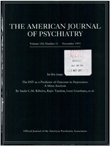Neuropsychological performance in medicated and unmedicated patients with Tourette's disorder
Abstract
OBJECTIVE: To date, there have been no formal investigations of neuropsychological performance in patients with Tourette's disorder who are taking psychotropic medications. The authors conducted this study to provide such information. METHOD: They examined the neuropsychological performance of 96 patients 6-18 years old who met DSM-III-R criteria for Tourette's disorder; 51 of these patients were taking neuroleptic medications and 45 were not. The groups were well matched with regard to age, sex, education, and duration of symptoms. Each group was given a complete neuropsychological test battery as well as instruments rating symptoms of Tourette's disorder, obsessive- compulsive characteristics, and other behavioral disturbances. RESULTS: The patients taking medications did not differ from those not taking medications on any of the neuropsychological, intellectual, or educational measures. In addition, the groups did not differ with regard to level of Tourette's disorder symptoms. CONCLUSIONS: The results of this investigation suggest that patients with Tourette's disorder who do not experience intolerable side effects from neuroleptic medications are able to perform on educational, intellectual, and neuropsychological tests at a level comparable to that of unmedicated patients. These results have positive implications for patients with Tourette's disorder who respond to neuroleptic medications.
Access content
To read the fulltext, please use one of the options below to sign in or purchase access.- Personal login
- Institutional Login
- Sign in via OpenAthens
- Register for access
-
Please login/register if you wish to pair your device and check access availability.
Not a subscriber?
PsychiatryOnline subscription options offer access to the DSM-5 library, books, journals, CME, and patient resources. This all-in-one virtual library provides psychiatrists and mental health professionals with key resources for diagnosis, treatment, research, and professional development.
Need more help? PsychiatryOnline Customer Service may be reached by emailing [email protected] or by calling 800-368-5777 (in the U.S.) or 703-907-7322 (outside the U.S.).



